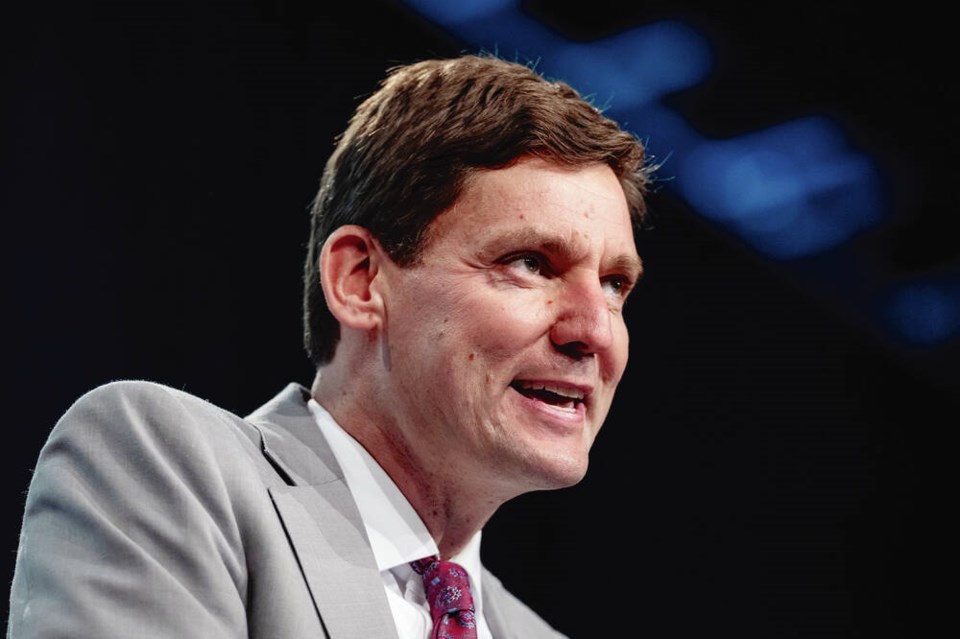VANCOUVER — Premier David Eby tried for a double on Thursday just ahead of the election campaign launch, tackling the housing crisis and his С����Ƶ Conservative opponent’s climate skepticism all in one go before 2,200 municipal leaders.
Ninety minutes before he addressed the Union of С����Ƶ Municipalities convention, his NDP government announced a huge deal in Vancouver that pitches homes at 40 per cent below market value on prime First Nations land at Heather Street, because the province is financing it.
“If we can do it there, we can do it right across the province.”
The good news is it will provide 2,600 homes for people and the $672 million that provincial taxpayers are fronting is expected to be paid back over the next 25 years.
The bad news is that it took over 10 years to pull the deal together.
Housing Minister Ravi Kahlon said “we jumped at the opportunity” for the deal. But after seven years in power, that’s a long, slow-motion jump.
It’s part of the NDP action plan “that will deliver, experts say, about 300,000 attainable middle-income housing units across the province,” Eby said.
The NDP’s original housing action plan seven years ago promised 114,000 new homes in 10 years. Assorted critics consistently pointed out they weren’t even coming close and had to creatively reinterpret the phrase “housing starts” to show even their current claimed tally of “something in the order of 87,000 starts.”
Almost tripling the stakes in the housing promise sweepstakes is an exercise in audacity, if nothing else.
Eby said it is a stark contrast to what Conservative Party of С����Ƶ Leader John Rustad is promising. He’s talked about eliminating the speculation tax, restoring the status quo on short-term rentals and shredding most of the dramatic changes made in the past two years.
The basic difference on housing is that С����Ƶ Conservatives seem intent on lessening government involvement in the market, while the NDP are keen to play an even bigger role.
“We believe that just the market on its own will not provide the housing that С����Ƶ needs,” Eby said.
He said the “magic” in the Heather Street deal is that the $672 million is not a grant or subsidy, but rather financing that will be repaid by long-term strata owners when they sell, or after 25 years.
Attacking Rustad’s climate change approach is a bigger challenge for Eby, because he just finished borrowing a chunk of it.
Eby’s remarkable promise last week to end the carbon tax on consumers if national law changes after the next federal election puts him on the same page as the С����Ƶ Conservatives.
He told delegates he made the commitment because people now simply can’t afford it. They are “put in the position for their families of choosing between taking climate action and paying for the basics.”
С����Ƶ Conservatives say the same thing, but Eby heaped scorn on Rustad for thinking “climate change is a hoax and lie and that carbon pollution can’t be bad because we’re made out of carbon.”
He told reporters С����Ƶ has a massive advantage in a low-carbon future but Rustad “says that’s a stupid thing to work for because climate change is a hoax.”
Eby is vague on how to replace the unspecified revenue loss if the tax is abandoned.
It brought in $2.6 billion, but most of that was from industry. The consumer-industry breakdown of the carbon tax take has not been made available.
“We’ll have to do some work to make sure that we’re protecting the province’s finances and supporting people,” Eby said.
The remaining policy difference on the carbon tax now is that the NDP plan to target “big polluters, the oil and gas companies that are making record profits,” while the С����Ƶ Conservatives will likely relax the industrial carbon tax as well as abandon the consumer portion.
Eby’s speech was generally well-received but the reaction was in the moderate range, with a few spontaneous applause breaks and two partial standing ovations.
Rustad is scheduled to make his pitch to the convention this morning and has been slotted in for a 10-minute speech before С����Ƶ Green Party Leader Sonia Furstenau gets her turn.
Then everyone launches the four-week run to Oct. 19 voting day, in a race that changed dramatically even before it started.
>>> To comment on this article, write a letter to the editor: [email protected]




